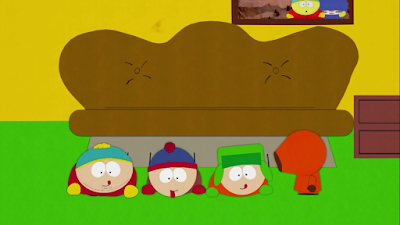
The first time I saw South Park, I was seven years old and I
didn't get it. The episode was "Tom's Rhinoplasty," where fourth
grade teacher Mr. Garrison gets plastic surgery and leaves town to become a
model, while the boys - Kenny, Cartman, Kyle and Stan - fall in love with their
lesbian substitute teacher.
Like the boys in the show, I was too young to understand
references to "eating box" or "licking carpet", and did not
understand the humour of Cartman and Kyle doing - literally - those things,
thinking it will turn them into lesbians and earn Ms. Ellen's affection.
I did understand the quirky humour of Mr.
Garrison's nose job consisting of simply pasting a photo of David Hasslehoff's
face onto his cartoon body, though:
Watching cartoon children cuss and learn about anal probing
aliens has to get old, but at the same time as the kids who delighted
in watching Kenny die each week started to lose interest, I was maturing enough
to recognize the genuine subversive wit in almost every episode.
The show was always subversive in a crass, simplistic way, primed for an adolescent audience,
by privileging the perspective of snot nosed kids who embraced it for its irreverence
for authority. But it was also a sophisticated satire with a focus on human
nature and what's wrong with the world.
In later seasons, creators Trey Parker and Matt Stone have tipped their hand and foregrounded the Serious Issues that have seemingly always fascinated them - even when the boys were licking carpet. To appreciate this, consider their most famous character: Eric Cartman, who has gone from school bully, to psychopath to, seriously mentally ill person, all in the run of one simple two dimensional cartoon.
In later seasons, creators Trey Parker and Matt Stone have tipped their hand and foregrounded the Serious Issues that have seemingly always fascinated them - even when the boys were licking carpet. To appreciate this, consider their most famous character: Eric Cartman, who has gone from school bully, to psychopath to, seriously mentally ill person, all in the run of one simple two dimensional cartoon.
South Park's very long run has
allowed Parker and Stone to flesh out Cartman's cruelty into a bona-fide mental
illness brought on by years of self loathing.
In season 1 when the Antichrist comes to South Park and finds the other kids don't like him, Pip explains "I think they make fun of the fat boy a lot too...but now I think they like him because he picks on me."
In doing so, South Park has also been able to sidestep one potential pitfall of satire: that is, that a certain slice of the audience will think the venal, anti-semetic, racist, sexist, all-purposes-awful Eric Cartman, is actually the hero, a harmless sort of scoundrel who we're supposed to identify with (They're called "South Park Republicans").
South Park is particularly ripe for accusations of racism - what with the sole black child being named "Token" and every other ethnicity (though particularly Asians) depicted as the most broad, offensive stereotypes imaginable. But in Eric Cartman, it also has the single greatest character for critiquing white male privilege (among many, many other things).
In season 1 when the Antichrist comes to South Park and finds the other kids don't like him, Pip explains "I think they make fun of the fat boy a lot too...but now I think they like him because he picks on me."
In the classic, "Cartman's Mom is a Dirty Slut" from season 1, we are privvy to this exchange:
Kyle: Mr. Mackey, something's really wrong with Cartman.
Mr. Mackey: (sarcastic) Oh, well there's a news flash!
Stan: No, no. We saw him a having a tea party with his stuffed animals.
Kyle: Yeah, he was doing their voices and pouring tea for them.
Mr. Mackey: Oooh okay, Eric is obviously suffering from some kind of emotional distress, mkay?
This is never not funny, especially when Mackey asks Kyle to film Eric's tea party without his knowledge and responds to Kyle's question of whether that's legal with an over-enthusiastic, "Oh hell yes!"
Cartman's tea party proceeds as follows:
Cartman: My goodness, that's a lovely dress you are wearing, Polly Prissy Pants.
Polly: Oh, thank you, Eric. You are a perfect gentleman, and you are smart and true.
Peter: Yes, Eric, you are strong and smart and true. Everybody likes you very much.
Cartman: That's niiice, Peter Panda...More tea, Rumpertumskin?
Rumpertumskin: Yes, please, Eric. You are tough and handsome.
Cartman: Thank you, Rumpertumskin. And what do you think about me, Clyde Frog?
Clyde: I think you're a big fat piece of crap.
Fourteen whole years later, Clyde, Polly, and Rumpertumskin return. After his poor fitness scores force the whole school to take extra phys ed classes, Eric is convinced another student is killing his stuffed animals as retribution, only to find that he, in a state of psychosis, is the one destroying is beloved imaginary friends.
"They were holding us back!" he says, in Polly Prissypants' voice, when he confronts her, "All the kids making fun of you at school, saying you're not keewl! Your stuffed animals all have to be gotten rid of, don't you see?!"
The point is that South Park has used its longevity to turn a simplistic dirty cartoon into something sophisticated and gut wrenching. Al the while, the wasteland of Eric Cartman's soul is as ripe for comedy and scorn as the substitute teacher who doesn't wear a bra (aka "Ms. Chokesondick").
In doing so, South Park has also been able to sidestep one potential pitfall of satire: that is, that a certain slice of the audience will think the venal, anti-semetic, racist, sexist, all-purposes-awful Eric Cartman, is actually the hero, a harmless sort of scoundrel who we're supposed to identify with (They're called "South Park Republicans").
Sociologists who've studied satire have found that this is often the case with the most iconic, "progressive" American satires. Archie Bunker - who Parker once said was an inspiration for Cartman - was supposed to satirize racist Americans in the 70s, but many of those same Americans felt they were sharing a laugh and being accepted by the broader culture.
South Park is particularly ripe for accusations of racism - what with the sole black child being named "Token" and every other ethnicity (though particularly Asians) depicted as the most broad, offensive stereotypes imaginable. But in Eric Cartman, it also has the single greatest character for critiquing white male privilege (among many, many other things).
Many Republicans saw the old Stephen Colbert on comedy central - a man who played in character as a right wing blowhard to highlight the flaws in their ideology - as a man who represents them, even as the man himself is a liberal who thought he was taking them down (no doubt this is how he ended up eviscerating George W. Bush to his face at the White House Correspondents dinner in 2006). Cartman is special, though, because of all the ways Parker and Stone go out of their way to show that he is broken and pathetic in ways that Bunker and Colbert never were.
To really appreciate just how far they've come though, I look back at "Tom's Rhinoplasty" where Mr. Garrison gets the face of
David Hasslehoff and learns that being beautiful brings with it as many (fake)
problems as being plain did, and Cartman eats a cardboard box in the misguided
belief that it will make him a lesbian. Crude, yes. Absurd, definitely. But
the message of the episode seemed to be that we shouldn't obsess over changing
ourselves to be a attractive to others. Thinking a nose job will make you happy
is about as ridiculous as pasting David Hasslehoff's head onto a cartoon body,
and no one can make themselves into the object of someone else's desire,
particularly if they don't really understand what that person desires in the
first place (i.e. the boys trying to become lesbians).
The B-plot of that episode is that Wendy Testerberger, being
jealous of Ms. Ellen for stealing the affection of her "boyfriend" Stan,
plots to destroy the other woman. It's an amusing and sort of cruel referendum
on female jealousy. Compare that to "The Hobbit" in season 17, where
Wendy (generally a sympathetic character outside of the time she had Ms. Ellen loaded onto a rocket and fired into the sun) - goes on
a crusade against Photoshop, leading all the other girls (and Kanye West) to
label her as a jealous hater.
In that episode, all the girls at South Park elementary can be called beautiful, as long as they have a photoshopped picture of themselves that
they can show people, to distract from the reality. In this world, true beauty
and character become irrelevant when it can be faked on the computer. Wendy begins
a crusade against this phoniness, then finally gives in with a tear in her eye.
Its the single greatest argument for South Park as not only a genius delivery system for highly relevant satire, but one that's actually gotten better with age.
Its the single greatest argument for South Park as not only a genius delivery system for highly relevant satire, but one that's actually gotten better with age.




